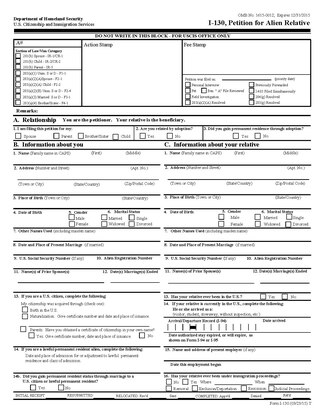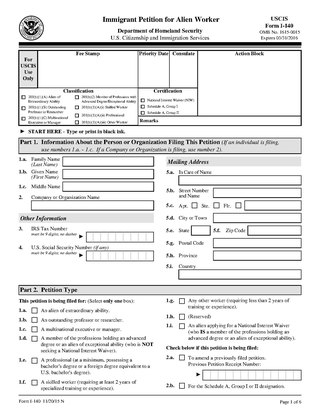Related Research Articles

The United States Immigration and Naturalization Service (INS) was an agency of the U.S. Department of Labor from 1933 to 1940 and the U.S. Department of Justice from 1940 to 2003.

A green card, known officially as a permanent resident card, is an identity document which shows that a person has permanent residency in the United States. Green card holders are formally known as lawful permanent residents (LPRs). As of 2019, there are an estimated 13.9 million green card holders, of whom 9.1 million are eligible to become United States citizens. Approximately 65,000 of them serve in the U.S. Armed Forces.
A K-1 visa is a visa issued to the fiancé or fiancée of a United States citizen to enter the United States. A K-1 visa requires a foreigner to marry his or her U.S. citizen petitioner within 90 days of entry, or depart the United States. Once the couple marries, the foreign citizen can adjust status to become a lawful permanent resident of the United States. Although a K-1 visa is legally classified as a non-immigrant visa, it usually leads to important immigration benefits and is therefore often processed by the Immigrant Visa section of United States embassies and consulates worldwide.
U.S. Citizenship and Immigration Services (USCIS) is an agency of the United States Department of Homeland Security (DHS) that administers the country's naturalization and immigration system. It is a successor to the Immigration and Naturalization Service (INS), which was dissolved by the Homeland Security Act of 2002 and replaced by three components within the DHS: USCIS, Immigration and Customs Enforcement (ICE), and Customs and Border Protection (CBP).

The Naturalization Act of 1906 was an act of the United States Congress signed into law by Theodore Roosevelt that revised the Naturalization Act of 1870 and required immigrants to learn English in order to become naturalized citizens. The bill was passed on June 29, 1906, and took effect September 27, 1906. It was repealed and replaced by the Nationality Act of 1940. It was modified by the Immigration Act of 1990.
The Security Through Regularized Immigration and a Vibrant Economy Act of 2007 or STRIVE Act of 2007 is proposed United States legislation designed to address the problem of illegal immigration, introduced into the United States House of Representatives. Its supporters claim it would toughen border security, increase enforcement of and criminal penalties for illegal immigration, and establish an employment verification system to identify illegal aliens working in the United States. It would also establish new programs for both illegal aliens and new immigrant workers to achieve legal citizenship. Critics allege that the bill would turn law enforcement agencies into social welfare agencies as it would not allow CBP to detain illegal immigrants that are eligible for Z-visas and would grant amnesty to millions of illegal aliens with very few restrictions.
The FBI Name Check is a background check procedure performed by the Federal Bureau of Investigation for federal agencies, components within the legislative, judicial, and executive branches of the federal government; foreign police and intelligence agencies; and state and local law enforcement agencies within the criminal justice system. The FBI Name Check is performed by the FBI as a part of the National Name Check Program, which dates back to Executive Order 10450 that was issued during the Eisenhower Administration. The FBI Name Check for an individual involves a search of the FBI's Central Records System Universal Index for any appearance of the name of the individual, as well as close phonetic variants and permutations of that name, in any of the records stored in the Universal Index. If any such occurrences are found, the Name Check also involves retrieval and analysis of the relevant paper and electronic files from local FBI offices and from other law-enforcement agencies.
The Office of Immigration Statistics (OIS) is an agency of the United States Department of Homeland Security under the Office of Strategy, Policy, and Plans.

Citizenship of the United States is a legal status that entails Americans with specific rights, duties, protections, and benefits in the United States. It serves as a foundation of fundamental rights derived from and protected by the Constitution and laws of the United States, such as freedom of expression, due process, the rights to vote, live and work in the United States, and to receive federal assistance.
The American Competitiveness in the 21st Century Act (AC21) was an act passed by the government of the United States in October 2000, pertaining to immigration to the United States. It was a complement to the American Competitiveness and Workforce Improvement Act that had been passed in 1998. The focus of AC21 was to change rules related to portability and caps for the H-1B visa to increase the effective number of visas available and make it easier for workers on those visas to switch jobs. Although the language of the Act references the Immigration and Naturalization Service (INS), the INS would soon be restructured and the functions of the INS referenced in AC21 would be handled by United States Citizenship and Immigration Services.

The American Civics Test is an oral examination that is administered to immigrants who are applying for U.S. citizenship. The test is designed to assess the applicants' knowledge of U.S. history and government. US Citizenship and Immigration Services (USCIS) administers the test as part of the naturalization process.
The H-1B Visa Reform Act of 2004 was a part of Title IV of the Consolidated Appropriations Act, 2005 in the United States that focused on changes to regulations governing H-1B visas. It was a successor to previous legislative changes affecting the H-1B, namely: the Immigration Act of 1990, American Competitiveness and Workforce Improvement Act (ACWIA) of 1998, and the American Competitiveness in the 21st Century Act (AC21) of 2000. The Consolidated Appropriations Act was signed by George W. Bush, then President of the United States, in early December 2004.
Premium Processing Service refers to an optional premium service offered by the United States Citizenship and Immigration Services to employers filing Form I-129 or Form I-140. To avail of the service, the employer needs to file Form I-907 and include a fee that is $1,500 for the H-2B and R classifications and $2,500 for all others.
The United States Citizenship and Immigration Services (USCIS) issues a number of forms for people to submit to them relating to immigrant and non-immigrant visa statuses. These forms begin with the letter "I". None of the forms directly grants a United States visa, but approval of these forms may provide authorization for staying or extending one's stay in the United States as well as authorization for work. Some United States visas require an associated approved USCIS immigration form to be submitted as part of the application.

Form I-130, Petition for Alien Relative is a form submitted to the United States Citizenship and Immigration Services by a United States citizen or Lawful Permanent Resident petitioning for an immediate or close relative intending to immigrate to the United States. It is one of numerous USCIS immigration forms. As with all USCIS petitions, the person who submits the petition is called the petitioner and the relative on whose behalf the petition is made is called the beneficiary. The USCIS officer who evaluates the petition is called the adjudicator.
The Legal Immigration Family Equity Act of 2000, also known as the LIFE Act and as the Legal Immigration and Family Equity Act, along with its Amendments, made some changes to laws surrounding immigration for family members of United States citizens and Lawful Permanent Residents, as well as people eligible for employment-based immigrant visas, in the direction of making it easier for family members and immigrant workers to move to and adjust status within the United States. It was passed on December 21, 2000, as title XI of Pub. L. 106–553 (text)(PDF).
Special Immigrant Juvenile Status (SIJS) is a special way for minors currently in the United States to adjust status to that of Lawful Permanent Resident despite unauthorized entry or unlawful presence in the United States, that might usually make them inadmissible to the United States and create bars to Adjustment of Status. The key criterion for SIJS is abuse, neglect, or abandonment by one or both parents.

Form I-140, Immigrant Petition for Alien Worker is a form submitted to the United States Citizenship and Immigration Service (USCIS) by a prospective employer to petition an alien to work in the US on a permanent basis. This is done in the case when the worker is deemed extraordinary in some sense or when qualified workers do not exist in the US. The employer who files is called the petitioner, and the alien employee is called the beneficiary; these two can coincide in the case of a self-petitioner. The form is 6 pages long with a separate 10-page instructions document as of 2016. It is one of the USCIS immigration forms.

Systematic Alien Verification for Entitlements (SAVE) is a program managed by United States Citizenship and Immigration Services (USCIS), a branch of the U.S. Department of Homeland Security (DHS). SAVE facilitates lookups on the immigration and nationality status of individuals in the United States. It is an intergovernmental initiative designed to help federal, state, tribal, and local government agencies, or by a contractor acting on the agency's behalf, to determine eligibility for benefits, licenses or grants, government credentials, or to conduct background investigations. It is one of two programs that uses the Verification Information System (VIS). The other program is the Electronic Employment Eligibility Verification Program, also known as E-Verify, and is used by employers to verify the immigration status of employees. For additional verification, SAVE relies on the Person Centric Query System (PCQS).
The Administrative Appeals Office, full name USCIS Administrative Appeals Office, and also known as the AAO and USCIS AAO, is an office within United States Citizenship and Immigration Services (USCIS) that can be used by petitioners to appeal adverse USCIS decisions made on their petitions. It is located in Washington, D.C., and all its in-person functions happen only in Washington, D.C.
References
- 1 2 3 4 5 6 "Adjustment of Certain Fees of the Immigration Examinations Fee Account". Federal Register. August 8, 2001. Retrieved December 19, 2021.
- 1 2 "§1356. Disposition of moneys collected under the provisions of this subchapter" . Retrieved December 19, 2021.
- 1 2 3 4 "Immigration Examinations Fee Account Fee Review Supporting Documentation with Addendum" (PDF). United States Citizenship and Immigration Services. May 1, 2020. Retrieved December 19, 2021.
- ↑ "Department of Homeland Security United States Citizenship and Immigration Services Budget Overview" (PDF). Retrieved December 19, 2021.
- ↑ "Audit Report: Immigration and Naturalization Service's Premium Processing Program" (PDF). United States Department of Justice Office of the Inspector General Audit Division. February 1, 2003. Retrieved December 19, 2021.
- 1 2 "Independent Offices Appropriations Act of 1952" . Retrieved December 19, 2021.